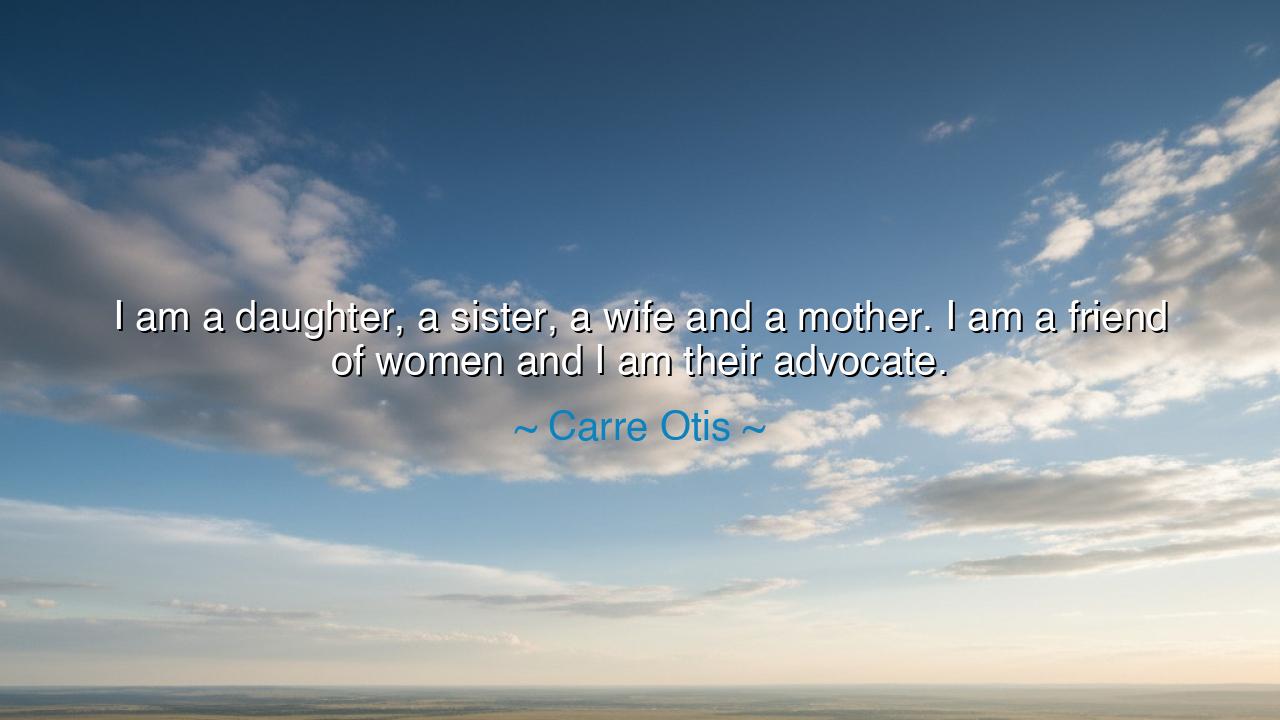
I am a daughter, a sister, a wife and a mother. I am a friend of
I am a daughter, a sister, a wife and a mother. I am a friend of women and I am their advocate.






Carre Otis, model turned truth-teller and defender of women’s dignity, once declared with unshaken strength: “I am a daughter, a sister, a wife and a mother. I am a friend of women and I am their advocate.” In these words she gathers the many roles that women bear and transforms them into a banner of solidarity. She proclaims not only her own identity but also her allegiance to all women, binding her personal journey to the greater struggle of sisterhood. To be advocate is not merely to speak, but to carry the burdens and voices of those silenced by the world.
The origin of this declaration lies in Otis’s own life, marked by both hardship and courage. She endured the brutalities of an industry that often treated women as objects, and later, she rose to confront the injustices she had suffered. Her words were born not from theory but from lived experience: the daughter who learned, the sister who shared, the wife who endured, the mother who nurtured. Each role became a pillar of her identity, and in them she found the authority to stand as a friend of women.
History reflects this pattern in countless heroines. Sojourner Truth, once enslaved, spoke before crowds as both mother and advocate, asking, “Ain’t I a Woman?” She, too, claimed the fullness of her identity and turned it into a weapon against oppression. Like Otis, she did not abandon her roles as woman, mother, or sister; she used them to illuminate injustice and to demand recognition for all women. Advocacy is strongest when it springs from the lived truth of those who suffer.
Her statement also challenges the world’s attempt to divide women against each other. By naming herself a friend of women, Otis rejects envy, rivalry, and silence. She affirms the ancient truth that women rise higher when they rise together. Just as in the suffrage movement, where unity among mothers, daughters, and sisters overcame centuries of exclusion, Otis’s words remind us that the struggle for dignity is collective, not solitary.
Therefore, O seekers of wisdom, remember this lesson: the strength of womanhood is not found in one role alone, but in the harmony of many. Daughter, sister, wife, mother, friend, advocate—each is a thread in a greater tapestry. Carre Otis’s words call to every generation: to honor these roles not as chains but as powers, and to turn private pain into public courage. For when women stand together as advocates for one another, they become unbreakable.






VKVan Kieu
This quote really resonates with me as it reflects the nurturing yet empowering nature of women’s relationships. It’s powerful that Carre Otis doesn’t just describe herself in familial roles but also as an advocate for women. In a way, this speaks to the importance of community and solidarity among women. But I wonder—how can women ensure that their advocacy is inclusive of all women, no matter their backgrounds or experiences?
HBHung Boythattinh
I love how this quote reflects the multifaceted roles that women occupy in society. It makes me think about the balance between personal identity and the desire to help others. Carre Otis doesn’t just identify as a daughter or mother; she actively positions herself as a friend and advocate for women. It makes me reflect on how women often have to juggle their own lives while also lifting each other up. How can we, as women, better support one another in our daily lives?
TTien
This quote speaks to the deep connection and responsibility that women feel for one another. Being a friend and advocate for women is so important in today’s world, where women often face challenges that men might not understand. But I wonder—how can women advocate for each other while still honoring their personal roles? Can one woman truly represent the voices of all women, or is advocacy more about supporting individual needs and experiences?
GTSata Gaming TV
I really like how this quote highlights the complexity of a woman’s identity. Being a daughter, sister, wife, and mother are significant roles, but advocating for other women takes it a step further. It makes me think—what does it mean to be an advocate for others? Does it require a certain level of self-awareness and understanding of women’s struggles, or is it more about collective solidarity?
TTay
This quote resonates with me because it reflects the many roles women play in society. It’s interesting how Carre Otis identifies with multiple aspects of womanhood, but also emphasizes the importance of advocating for other women. Does being a daughter, sister, wife, and mother define her identity, or is it the advocacy for other women that really sets her apart? I think it's a reminder of how interconnected our lives and identities are.